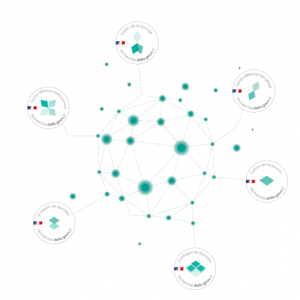The IFB and its regional platforms are working to promote open science in a number of ways: by making shared computing and storage resources available, by supplementing its resources with workflow management solutions, by democratising containers and virtual environments, by offering training courses to a variety of audiences, and by developing tools and services to support scientists at different stages in the data lifecycle.
The IFB has been named a Thematic Reference Center for Biology and Health by the French Ministry of Research and Higher Education (MESR), for the Resarch Data Gouv ecosystem.
Research Data Gouv is a national ecosystem designed to support the scientific community in the virtuous management of their research data. The opening up of research data is strongly encouraged, as part of the national plan for open science (PNSO). As such, the IFB participates in all the actions and initiatives of the ecosystem, in particular in interaction with the regional data workshops.
As a thematic reference centre, the IFB must lead the life science and health communities in defining best practice guidelines for data management. This requires the involvement of a wide range of players, representative of the great heterogeneity of data in the field. To this end, a research data group is working within the national biology and health infrastructures club.
The various initiatives to develop open-science tools and services at the IFB will eventually be able to consolidate the recommendations put forward by the reference center.

Thanks to a web interface and an API, FAIR-Checker has been massively used the last 6 months with a mean of 163k evaluations per month.
FAIR-Checker is grounded to semantic web W3C standards and technologies which is key for interoperability. FAIR-Checker is in line with the GO-FAIR and RDA FAIR data maturity model. FAIR-Checker has been recently published in the Journal of Biomedical Semantics (https://doi.org/10.1186/s13326-023-00289-5 ). Compared to other tools such as F-UJI or FAIR Evaluator, its main originality resides in i) fine-grained metrics aimed at promoting the use of already deposited ontologies terms and ii) the use of community-driven Bioschemas profiles to help developer prioritize their work on possibly missing required, recommended or optional metadata.
FAIR-Checker is one of the key resources of the Elixir-FR open science and interoperability roadmap, scientifically recognized by peers, as well as running in production to serve thousands of FAIR-assessments per month. It is supported by the infrastructure itself (permanent FTE) and by software developers recruited through funded projects (national grant PIA2 11-INBS-0013). Thanks to its genericity, in its future evolutions, FAIR-Checker will be tuned to also tackle the needs of non-Life-Science communities (i.e. research data management area).These connectors make Madbot highly flexible and adaptable to a wide range of research environments. It already interfaces with many data management and analysis tools used daily by researchers, such as electronic laboratory notebooks (Labguru, eLabFTW), file storage systems (NAS, Seafile), research data warehouses (Zenodo, very soon ENA), web-based analysis platforms (Omero, Galaxy) and cluster infrastructures accessible via SSH. The application's architecture is based on the ISA (Investigation, Study, Assay) standard, enabling connectors to be created with virtually all the tools.
Madbot offers a cross-disciplinary view of the data and metadata for each research project. It enables researchers and their teams to gradually adopt a virtuous approach to managing their data, while helping them to achieve FAIR publication.
All the developments and results of this project will be made available to the entire scientific community on the GitLab collaborative platform under an open licence.